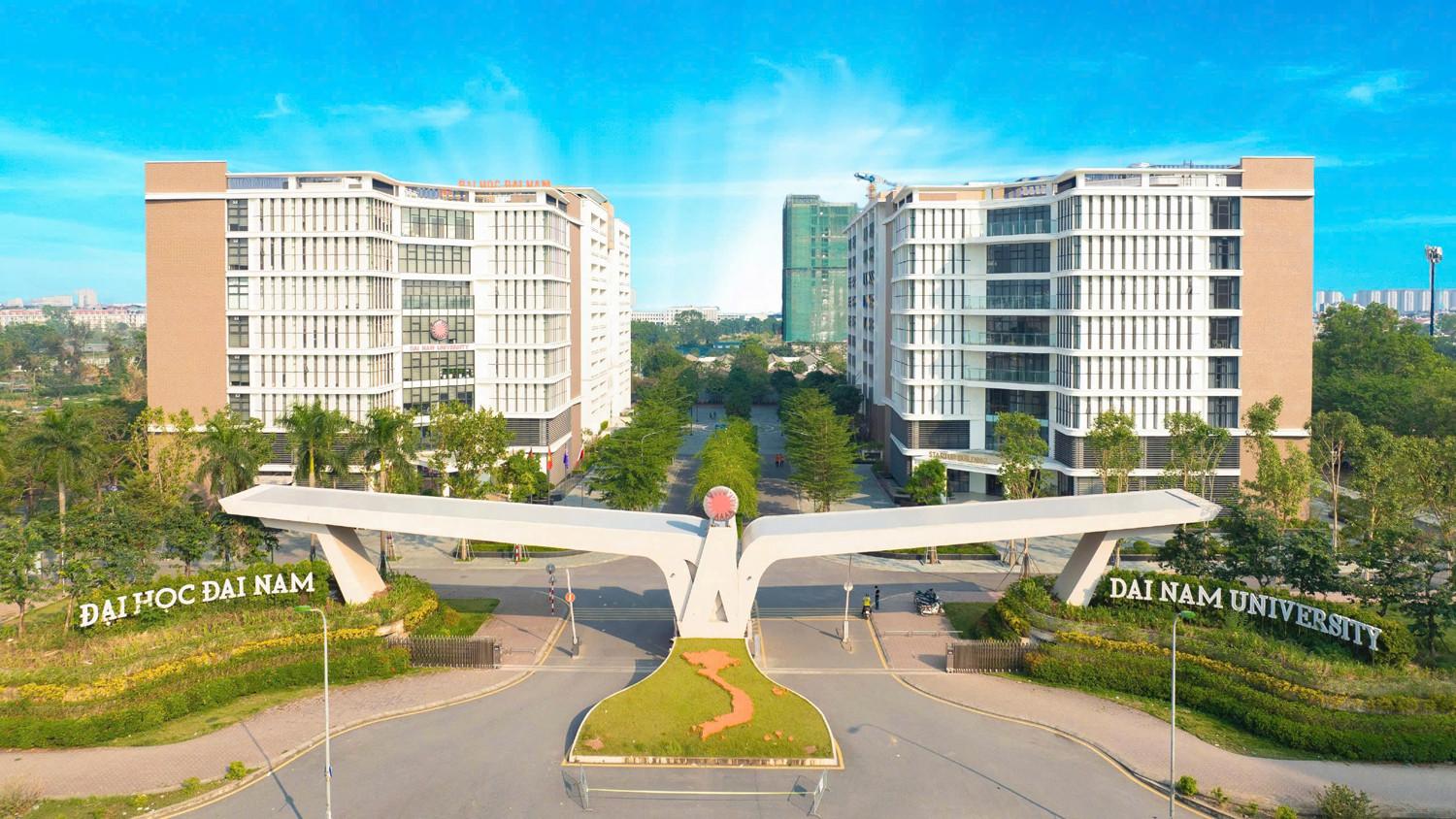10 reasons to study Japanese Language at Dai Nam University

With the advantages of great job opportunities, good benefits, diverse fields of work, the ability to study and work across borders, high income, unlimited self-development potential, etc., the Japanese Language major is increasingly attractive to GenZ. Below are the top 10 reasons to study Japanese Language at Dai Nam University.

Japanese Language Industry has strong appeal to GenZ.
Overview
- Training program name (Vietnamese): Japanese language.
- Training program name (English): Japanese Language.
- Training code: 7220209.
- Education level: Bachelor.
- Training time: 3.5 years.
- Training form: Full-time.
- Degree name (Vietnamese): Bachelor of Japanese Language.
- Degree name (English): The Degree of Bachelor in Japanese Language.
- Training language: Japanese.
- School/Degree granting unit: Dai Nam University.
- Name of the faculty implementing the training program: Faculty of Japanese Language and Culture.
- Comparative training program: Tokyo University of Foreign Studies, Japan and Hanoi University.
What is Japanese Language?
The Japanese Language major equips students with solid and extensive knowledge of the Japanese language. In addition, students are provided with additional knowledge of geography, history, politics, socio-economics, education, literature, etc.
Bachelor of Japanese Language can use Japanese fluently (equivalent to level 5/6 of Vietnam's 6-level Foreign Language Competency Framework; equivalent to JLPT N2) in translation, commerce, Japanese teaching and other specialized fields using Japanese.
What do you study in Japanese Language?
Studying Japanese language at Dai Nam University, students are equipped with basic and in-depth knowledge of Japanese language and culture.
In addition to mastering Japanese listening - speaking - reading - writing skills, learners are also equipped with specialized knowledge in translation, commerce, teaching, and many other supplementary knowledge such as Japanese for tourism, Japanese for journalism, Vietnam - Japan economic relations, etc. to be able to work in different fields using Japanese.
Learners are also equipped with basic soft skills, advanced soft skills, IT skills, positive attitude, discipline and lifelong health habits...
In particular, during the course, students are also trained in Japanese communication principles, behavior and professional working attitudes to be able to integrate well when working in Japanese companies as well as in international working environments.

Japanese Language Department of Dai Nam University is one of the departments with a large number of candidates applying for admission each university admission season.
Differences in the Japanese Language training program of Dai Nam University
- Training motto: Training learners with solid and extensive professional knowledge of Japanese language; having autonomy, research capacity and skills to help learners adapt to the international working environment.
- Training objectives: Bachelor of Japanese Language can use Japanese fluently in the directions of Translation and Interpretation, Business Japanese, Teaching Japanese and other specialized fields using Japanese; have Japanese cultural behavior skills, independent critical thinking, leadership skills, entrepreneurship, teamwork, can create jobs for themselves and others.
- Training program: 3.5 years (3 semesters/year) helps save time and costs, entering the labor market early.
The training program ensures to provide learners with core knowledge and skills, closely following the needs of society and global trends. Learners can choose from 3 majors to study, including: Business Japanese; Japanese Translation and Interpretation and Japanese Teaching.
In addition, the Faculty's Oriental Studies major is also an option to help students explore the country and people of Japan with high career opportunities.
Who are the teaching staff?

A team of good, dynamic and enthusiastic lecturers with students.
100% of lecturers have a Master's degree or higher, and are well-trained from prestigious universities at home and abroad.
Most of the lecturers have short-term study, Masters, PhDs in Japan and have practical experience at Japanese enterprises.

What do students experience during their studies?

Dynamic and modern university environment.
- Paid internship program in Japan from 06 months to 12 months for students from the 2nd year with Japanese proficiency equivalent to JLPT N3.
- Participate in language and cultural exchange activities with students from universities from Japan, such as: Osaka University of Foreign Studies, Kyoto Tachibana University, etc...
- Japanese speech contest for Japanese language students organized by domestic and foreign schools and units.
- Participate in soft skills camps, interview skills training courses, and CV writing courses at Japanese companies.

Experience the land, people and culture of Japan.
- Participate in activities to experience communication skills, presentation, and confidence in front of a crowd: elegant students, Ms & Mr Sakura, ...
- The club enhances Japanese Language and Culture experience activities: Yosaikoi dance, Japanese cuisine, Yukata, Origami, calligraphy, Kimono... and more than 30 clubs to help students maximize their abilities, strengths and preserve the beautiful youth.

- Participate in scientific research: Improve self-study and research skills, increase understanding and ability to make a professional report.
- A variety of movement activities to help develop yourself comprehensively: Love Cake, Traditional Camp, Warm Winter, Green Summer...
Output standards according to capacity
- In the first year, in addition to basic knowledge of social sciences, political science, law, modern information technology, soft skills, etc., students will learn Japanese at the elementary level and the early stages of the intermediate level.
After the first year, students can undertake simple office work in businesses and establishments that use Japanese.
- In the second year, students will have 03 additional semesters of general subjects, a second foreign language (English, Chinese or Korean) and continue to improve their Japanese language. Students will study Japanese at intermediate and advanced levels. In addition, students will learn additional knowledge and choose a Japanese language study direction according to their interests and abilities. Students will also learn professional skills to perform professional tasks, solve complex problems, evaluate work products in translation and interpretation, business, and teaching Japanese.
After the second year, students can work as translators and interpreters, handle work using Japanese related to business or teaching, etc. at businesses and facilities that use Japanese. Students can also participate in interviews for paid internships for 6 months to 1 year in Japan.

Output standards for each academic year help students have a clear and effective learning path.
- In the third year , students will focus on studying specialized subjects according to the chosen direction, perfecting Japanese to achieve Japanese output standards equivalent to level 5/6 (equivalent to JLPT N2).
With the basic knowledge of general subjects and Japanese proficiency equivalent to level 5/6 and specialized knowledge learned in the third year, students can participate in career orientation internships, graduation internships related to their study orientation at businesses and facilities that use Japanese. Students can also participate in interviews for paid Internships for 6 months - 1 year in Japan.
- In the final semester, students complete specialized courses and complete Japanese language certificates to ensure Japanese language output standards equivalent to level 5/6 according to Vietnam's 6-level Foreign Language Competency Framework. Students will also write and report their graduation thesis if they reach the required level or study courses that replace the graduation thesis.
With basic knowledge of general subjects and Japanese proficiency equivalent to level 5/6 and specialized knowledge learned in the final year of university, students can fully participate in work related to their study orientation at businesses and establishments that use Japanese.
Where do Japanese Language students practice and intern?
- At businesses, Japanese language training facilities in the country and intership in Japan.
- Students in the 2nd year or above with Japanese proficiency equivalent to N3 will have the opportunity to do paid internships in Japan for 6-12 months at businesses that are partners of the Faculty such as: Sekai Jinzai Co., Ltd., Hirado Kaijo Hotel, KPG Hotel & Resort Group, H&S Co., Ltd., Enterprises belonging to the Vietnam Business Association in Japan VBJA...
- During the course, students will participate in practical internship programs, training, and field trips from 3-7 days at large Japanese businesses and corporations in Vietnam.

List of internship facilities for Japanese Language major
| Status | Name of internship facility | Number of receptions | Internship time | Internship position |
| 1 | JLAN Vietnam Company Limited | 25 | 1-3 months | International Trade Officer |
| 2 | Giang Anh Group Study Abroad Consulting and Trade Joint Stock Company | 25 | 1-3 months | Teacher Japanese |
| 3 | Vinayuuki International Cooperation Joint Stock Company | 15 | 1-3 months | Teacher Japanese |
| 4 | Minh Hien Education Services Company Limited | 20 | 1-3 months | Teacher Japanese |
| 5 | Haruka Co., Ltd. | 15 | 1-3 months | Interpreter |
| 6 | EOE Company Limited | 10 | 1-3 months | International Trade Officer |
| 7 | Viet Sun Trading and Service Company Limited | 10 | 1-3 months | Tour guide, travel agent |
What are the job opportunities like?
Bachelor of Japanese Language, Dai Nam University can take on the following job positions:
VT01. Translator/Editor/Reporter
- Translators and interpreters work for state organizations such as diplomacy, economics, education, tourism, culture, society or domestic and foreign private enterprises, etc.
- Editors working at Publishing Houses with publications in Vietnamese and/or Japanese. Journalists of newspapers, radio, media, etc.
- Collaborators working at notary offices.
VT02: Office Secretary/Foreign Affairs Assistant
- Specialist/employee working for state or private agencies and organizations, in charge of work related to foreign affairs, business relationship management, import-export, negotiation, signing, and monitoring contract implementation; project management, and marketing.
VT03: Japanese Teacher/Researcher
- Teachers teaching at Japanese language training institutions;
- Researchers working at training and research institutions on Japanese Language and Culture, etc.
VT04: Human resources working in the field of commerce and other fields using English
Japanese such as import-export, negotiation, signing, monitoring contract implementation; project management, marketing, tourism, etc.
How much is the salary after graduation?
The salary of the Japanese Language industry will depend on the working position as well as the capacity and professional skills of each person. With studying Japanese language, students do not need to finish 4 years of university to be able to work with a fairly stable income.
Students majoring in Japanese Language can earn up to 34 million VND/month after graduation.
For those of you who do not have much work experience, you will receive an average salary of about 500 - 800 USD/month (equivalent to 11 - 17 million VND/month).
- For individuals with experience working at the management or assistant level, the average salary is around 1000 USD/month (equivalent to 23 million VND/month).
- With 3 - 5 years of experience or more, the average salary you can receive will be 1500 USD/month (equivalent to 34 million VND/month).
Qualities suitable for Japanese Language industry

+ Love Japanese language and Japanese culture
+ Love to communicate and eager to learn
+ Dynamic, extroverted personality
+ Confidence and courage
+ Ability to organize, arrange work, and manage time
+ Diligent, hard-working, persistent, hard-working
Faculty training partners
- Japanese Language Education Association JLAN
- GAG Japanese Language Academy
- Osaka Minami Japanese Language School
- Vietnam Business Association in Japan VBJA
- KPPG Hotel & Resort Group
- Hirado Kaijo Hotel
- Hakone Yumoto Onsen Aura Tachibana Hotel Chain
- Orihagen Kanko Hotel
- Iizaka Jura Hotel
- Sekai Jinzai Joint Stock Company
- H&S Co., Ltd., Japan
- Kaishi Co., Ltd., Japan
How much is the tuition?
- 39 million/year (3 semesters).
- Dai Nam University commits not to increase tuition fees during the course.
What are the methods of selection?

+ Method 1: Use the results of 03 subjects from the high school graduation exam results according to the registered combination for admission consideration.
+ Method 2: Use the results of 03 subjects from the 12th grade high school study results according to the registered combination for admission consideration.
+ Method 3: Direct admission according to regulations of the Ministry of Education and Training and the School.
+ Method 4: Admission of foreign high school graduates
REGISTER FOR ADMISSION: HERE









